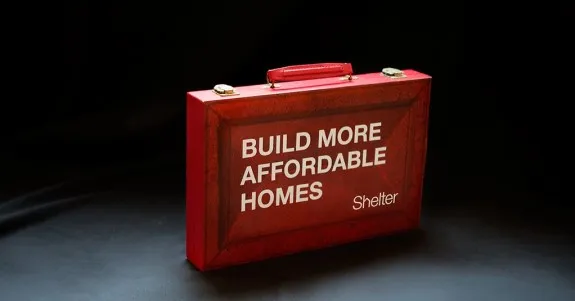Osborne chooses housing
Published: by Toby Lloyd

Make no mistake – today’s Comprehensive Spending Review was, overall, good news for housing. We’ve been calling on the Chancellor to do much, much more to increase house building ever since the 60% cut to the budget in 2010. You can do so too, here. Today, that cut was finally reversed as the budget for the three years 2018-2021 was roughly doubled.
This is welcome – given some pretty toe-curling rumours going around in the run up to today’s announcement: that the entire house building budget would be scrapped, that housing associations would be privatised, that existing social homes would all be sold off or given away. Happily, none of these have happened. Instead we’re promised a significant increase in government investment in new homes – which will finally be treated as part of the nation’s vital infrastructure.
Less positively the bulk of this investment will be going towards homes to buy, with little or nothing for those on lower incomes facing the brunt of our affordable housing shortage. This is a major flaw in the plan, but is hardly surprising, as it’s in keeping with the Conservatives’ election manifesto and other recent announcements. That said, it’s still better than it might have been. We’re very concerned that Starter Homes (for sale at 20% off the market rate) will be totally unaffordable to most people – but at least this is not the only product the CSR will fund. There will be increased funding for Shared Ownership too, and while this is still not affordable for around half of the country, it’s better than Starter Homes, as at least the public investment is preserved for future generations. And there was also a small commitment to pilot a ‘Rent to Buy’ product – something we’ve long thought has potential for those who cannot afford to buy under the existing schemes.
We’re also pleased to see the Chancellor recognising that the housing market is not a level playing field. Buy to Let landlords, and wealthy second home buyers, have huge advantages over Britain’s hard pressed first time buyers. The total value of Buy to Let mortgages on new home purchases has increased by 40% over the last year alone. Osborne’s plan to increase Stamp Duty on these buyers is a good idea, especially as he’s explicitly promised to use the revenue to support new building.
Finally, it seems that the Homelessness Prevention Grant has been spared the axe: this provides vital support for local authorities to help people facing homelessness, and there were fears it might go.
It’s not all good news though. There’s a worrying cut to the housing benefit that social tenants will be able to claim from 2018, which will hit some vulnerable tenants hard – potentially making it impossible for them to get a secure, low rent home at all. And there’s a technical change to the way that Temporary Accommodation is paid for that could increase the strain on a part of our housing safety net that’s already under intolerable pressure. We’ll need to analyse these proposals in detail, and will be keeping a careful eye on developments.
And of course, there are still plenty of damaging things in the Housing and Planning Bill going through Parliament as we speak. Most importantly the forced sale of existing council homes on the open market is a totally unwarranted attack on genuinely affordable homes to rent, and one that we will continue to fight. But at least the Chancellor seems to have found new money to support today’s house building pledges, rather than relying on yet more sell offs of the homes we already have.
All in all, it’s great that the Chancellor has heard our calls for more investment in the homes we so urgently need. In the last three months, 23,703 people signed our petition calling him to do so.
We’ll be holding the government’s feet to the fire to honour the positive pledges made today – and continuing to campaign for more genuinely affordable homes as part of the mix.
